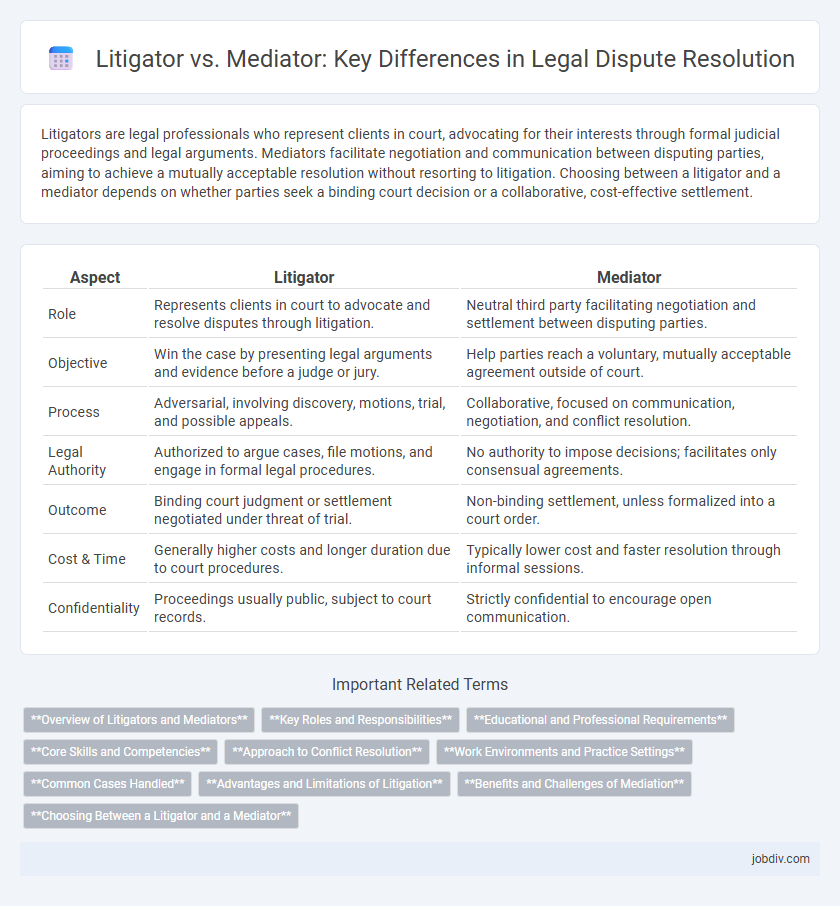Litigators are legal professionals who represent clients in court, advocating for their interests through formal judicial proceedings and legal arguments. Mediators facilitate negotiation and communication between disputing parties, aiming to achieve a mutually acceptable resolution without resorting to litigation. Choosing between a litigator and a mediator depends on whether parties seek a binding court decision or a collaborative, cost-effective settlement.
Table of Comparison
| Aspect | Litigator | Mediator |
|---|---|---|
| Role | Represents clients in court to advocate and resolve disputes through litigation. | Neutral third party facilitating negotiation and settlement between disputing parties. |
| Objective | Win the case by presenting legal arguments and evidence before a judge or jury. | Help parties reach a voluntary, mutually acceptable agreement outside of court. |
| Process | Adversarial, involving discovery, motions, trial, and possible appeals. | Collaborative, focused on communication, negotiation, and conflict resolution. |
| Legal Authority | Authorized to argue cases, file motions, and engage in formal legal procedures. | No authority to impose decisions; facilitates only consensual agreements. |
| Outcome | Binding court judgment or settlement negotiated under threat of trial. | Non-binding settlement, unless formalized into a court order. |
| Cost & Time | Generally higher costs and longer duration due to court procedures. | Typically lower cost and faster resolution through informal sessions. |
| Confidentiality | Proceedings usually public, subject to court records. | Strictly confidential to encourage open communication. |
Overview of Litigators and Mediators
Litigators are legal professionals who represent clients in court, specializing in dispute resolution through formal judicial proceedings. Mediators facilitate negotiated agreements between conflicting parties without resorting to litigation, emphasizing communication and compromise. Both roles require strong legal expertise, but litigators focus on advocacy and trial strategy, while mediators prioritize conflict resolution and collaboration.
Key Roles and Responsibilities
Litigators represent clients in court, managing all aspects of a lawsuit including investigation, pleadings, discovery, trial preparation, and courtroom advocacy to achieve a favorable judgment. Mediators facilitate negotiations between disputing parties, guiding them toward a mutually acceptable settlement without providing legal advice or imposing decisions. While litigators advocate for their client's interests through adversarial processes, mediators focus on conflict resolution by fostering communication and compromise.
Educational and Professional Requirements
Litigators typically require a Juris Doctor (JD) degree, passing the bar exam, and strong courtroom experience, emphasizing skills in legal research and trial advocacy. Mediators often hold advanced degrees in law, psychology, or conflict resolution, with certifications in mediation practice, prioritizing negotiation and communication expertise. Both roles demand continuous education, but litigators focus on litigation strategies while mediators specialize in dispute resolution techniques.
Core Skills and Competencies
Litigators possess strong analytical reasoning, persuasive communication, and courtroom advocacy skills essential for presenting cases and navigating complex legal procedures. Mediators excel in active listening, neutrality, and conflict resolution techniques to facilitate negotiations and achieve mutually agreeable settlements. Both roles require deep legal knowledge, but litigators focus on litigation strategy while mediators prioritize collaboration and dispute de-escalation.
Approach to Conflict Resolution
Litigators resolve conflicts through formal judicial processes, presenting evidence and legal arguments in court to obtain a binding decision. Mediators facilitate negotiation between disputing parties, encouraging communication and compromise to reach a mutually agreed-upon settlement outside of court. The litigator's approach relies on adversarial procedures, while the mediator emphasizes collaborative problem-solving and consensus-building.
Work Environments and Practice Settings
Litigators primarily operate within courtrooms, law firms, or government agencies, engaging in adversarial legal proceedings that demand extensive preparation and courtroom advocacy. Mediators typically work in neutral settings such as mediation centers, private offices, or community organizations, facilitating dialogue and negotiation between disputing parties without formal litigation. While litigators rely on formal procedures governed by rules of evidence and court protocols, mediators focus on collaborative problem-solving in less structured, confidential environments.
Common Cases Handled
Litigators primarily handle contentious cases such as contract disputes, personal injury claims, and criminal defense that require courtroom representation and legal advocacy. Mediators facilitate resolution in family law matters, employment disputes, and small business conflicts by guiding parties toward mutually agreeable settlements outside of court. Both roles are essential in managing legal conflicts, with litigators focusing on adjudication and mediators emphasizing collaborative negotiation.
Advantages and Limitations of Litigation
Litigation provides the advantage of a legally binding judgment enforced by the court, ensuring resolution through a formal adversarial process that upholds procedural rules and evidentiary standards. Its limitations include high costs, lengthy timelines, and the potential for an unpredictable outcome due to the judge or jury's discretion. The public nature of litigation may also expose sensitive information, impacting confidentiality compared to alternative dispute resolution methods.
Benefits and Challenges of Mediation
Mediation offers benefits such as confidentiality, cost-effectiveness, and faster resolution compared to traditional litigation, allowing parties to maintain control over the outcome. Challenges include potential power imbalances between parties, lack of formal procedures to enforce agreements, and the need for voluntary participation, which may limit its effectiveness in high-conflict disputes. Understanding these factors helps legal professionals decide when mediation is the most appropriate dispute resolution method.
Choosing Between a Litigator and a Mediator
Choosing between a litigator and a mediator depends on the nature and goals of the dispute resolution process; litigators are essential for cases requiring formal court representation and legal advocacy, while mediators facilitate negotiation to reach mutually agreeable settlements outside the courtroom. Factors such as the complexity of the legal issue, cost considerations, time constraints, and the desire for confidentiality influence this decision. Understanding the advantages of litigation's enforceable judgments versus mediation's collaborative problem-solving approach ensures informed selection tailored to specific legal needs.
Litigator vs Mediator Infographic

 jobdiv.com
jobdiv.com